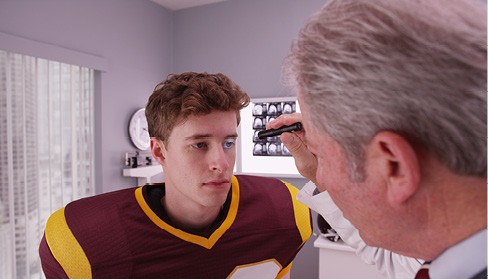Concussion Specialty Program
Concussion Specialty Program
Helping you conquer a concussion, one step at a time
Members of Excel Physical Therapy’s Concussion Specialty Program provide comprehensive post-concussion physical therapy to patients experiencing symptoms such as headaches, dizziness, and balance issues, with a focus on returning them to work, school, sports, and other normal activities.
WHAT IS A CONCUSSION?
A concussion is a temporary brain injury that results in disrupted neurological function and can cause a wide range of symptoms. A concussion can be a result of a direct blow to the head or a direct blow to a different part of the upper body that transmits force indirectly to the head. Many times, this type of injury results from a sport collision, car accident or fall.
The symptoms of a concussion may start immediately or soon after the injury occurs and will typically evolve over the following hours, or even days. While most concussions are relatively mild, it is imperative to receive a full medical evaluation if this type of injury is suspected. Quick, appropriate treatment is paramount in completing a full recovery.
Even with rapid treatment, symptoms of a concussion have proven to be stubborn. The inability to focus, dizziness, headache and lack of balance may linger as a person tries to progress back into their normal activities of daily life. Whether a concussion injury is acute, or the symptoms turn out to be chronic, Excel Physical Therapy is here to help you overcome your injury.
EXCEL’S IN-HOUSE SPECIALTY PROGRAM
In order to qualify for our in-house Concussion Specialty Program, our distinguished physical therapists must have demonstrated a passion for achieving superior patient outcomes in patients who have suffered a concussion, aiding them through an effective recovery plan that is both individualized and patient-centered.
In addition to pursuing a rigorous course of continuing education, EXCEL’s concussion specialists actively promote community awareness about concussion prevention and symptoms. We work with premier local physicians, surgeons, and rehabilitation experts to set up in-services (in-house seminars) where our therapists can learn about new procedures, cutting edge techniques, and emerging rehab protocols and best practices.
Our Concussion Specialty Program also provides a venue for our clinicians to collaborate on particularly difficult or complex cases, which ensures that every patient receives the benefit of the best, most advanced knowledge that EXCEL has to offer.
HOW PHYSICAL THERAPY CAN HELP
- Oculomotor treatment involves the evaluation and coordination of eye movements, tracking and focusing. Part of a physical therapy evaluation for a concussion assesses eye movement and how that movement can elicit symptoms. Once these challenging movements are identified, they can be treated through practice.
- Vestibular treatment includes the assessment of dizziness and ability, or inability, to stabilize vision. Following concussion injuries, a patient may have trouble focusing when they are moving or have poor body awareness. Physical therapy can help determine what activities provoke such feelings of uneasiness and help retrain the vestibular system accordingly.
- Balance treatment addresses the challenges in maintaining spatial orientation. Many patients will complain of feeling unsteady and/or demonstrate an inability to balance. A physical therapist will be able to assess balance deficits and design a treatment plan that tackles those symptoms.
- Musculoskeletal symptoms are evaluated for every concussion patient. Some concussion related symptoms may be a result of a muscular strength or range or motion deficit, especially of the cervical spine (neck). A physical therapy treatment plan may include exercises, hands-on manual treatment and/or modalities to resolve these issues.
- Exertion testing involves the monitoring of concussion symptom development while increasing heart rate. While at rest, a patient may feel fine; however, once their heart rate is increased, symptoms tend to recur. Active exertion is another important part of the treatment of concussion but requires a tactful professional to increase activity and exertion, while still being able to manage symptoms.
- Return to Play programming progresses patients through functional activity that resembles their regular sport or life. Our facilities boast large, open spaces for true sport-specific exercise. Such exercises challenge all of the above-mentioned systems and should be practiced before returning to a high risk sport or activity.
The management of concussion symptoms while increasing a person’s activity level requires an experienced clinician to appropriately plan the treatment to conquer this type of injury.
No prescription? No problem.
You can start physical therapy without a prescription or referral from a doctor, through a program called "Direct Access." Even better, it's usually covered by insurance. Give us a call, we're happy to check your coverage for you.
WEBINAR: Concussion Mythbusters – The Truth About Sports Concussions and Recovery
We hosted a webinar to discuss sports concussions and their recovery. An estimated 1.6 to 3.8 million concussions result from sports/recreational activity in the U.S. each year. Immediate treatment is imperative in a safe recovery and return to sport.
BLOG: DPT — It’s Easy as 1, 2, 3! What the Letters After Your PT’s Name Mean
When looking for a physical therapist, you might have noticed different letters after the therapist’s name. We break down the most common abbreviations and what they mean to you.


